
The Royal Ulster Constabulary (RUC) was the police force in Northern Ireland from 1922 to 2001. It was founded on 1 June 1922 as a successor to the Royal Irish Constabulary (RIC) following the partition of Ireland. At its peak the force had around 8,500 officers, with a further 4,500 who were members of the RUC Reserve.

The Metropolitan Police Service (MPS), formerly and still commonly referred to as the Metropolitan Police, is the territorial police force responsible for law enforcement and the prevention of crime within the ceremonial county of Greater London. In addition, it is responsible for some specialised matters throughout the United Kingdom, including national counter-terrorism measures and the protection of specific people, such as the monarch and other members of the royal family, members of the government, and other officials.
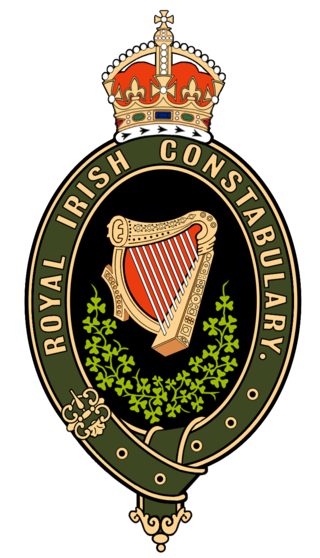
The Royal Irish Constabulary was the police force in Ireland from 1822 until 1922, when all of the country was part of the United Kingdom. A separate civic police force, the unarmed Dublin Metropolitan Police (DMP), patrolled the capital and parts of County Wicklow, while the cities of Derry and Belfast, originally with their own police forces, later had special divisions within the RIC. For most of its history, the ethnic and religious makeup of the RIC broadly matched that of the Irish population, although Anglo-Irish Protestants were overrepresented among its senior officers.

Partick is an area of Glasgow on the north bank of the River Clyde, just across from Govan. To the west lies Whiteinch, to the east Yorkhill and Kelvingrove Park, and to the north Broomhill, Hyndland, Dowanhill, Hillhead, areas which form part of the West End of Glasgow. Partick was a Police burgh from 1852 until 1912 when it was incorporated into the city. Partick is the area of the city most connected with the Highlands, and several Gaelic agencies, such as the Gaelic Books Council are located in the area. Some ATMs in the area display Gaelic.
Red Clydeside was the era of political radicalism in Glasgow, Scotland, and areas around the city, on the banks of the River Clyde, such as Clydebank, Greenock, Dumbarton and Paisley, from the 1910s until the early 1930s. Red Clydeside is a significant part of the history of the labour movement in Britain as a whole, and Scotland in particular.
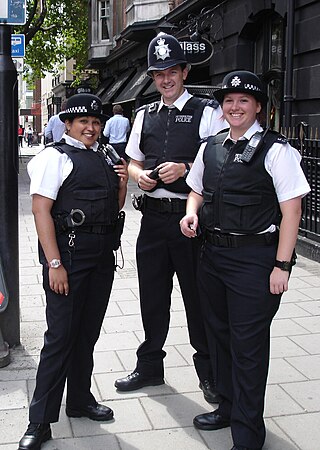
Law enforcement in the United Kingdom is organised separately in each of the legal systems of the United Kingdom: England and Wales, Scotland, and Northern Ireland. Most law enforcement duties are carried out by those who hold the office of police constable of a territorial police force.
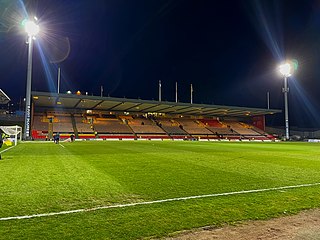
Firhill Stadium, also known as Wyre Stadium at Firhill for sponsorship reasons, is a football and former rugby union, rugby league and greyhound racing stadium located in the Maryhill area of Glasgow, Scotland which has been the home of Partick Thistle since 1909.

The City of Glasgow Police or Glasgow City Police was the police covering the city and royal burgh of Glasgow, from 1800 to 1893, and the county of city of Glasgow, from 1893 to 1975. In the 17th century, Scottish cities used to hire watchmen to guard the streets at night, augmenting a force of unpaid citizen constables. On 30 June 1800 the authorities of Glasgow successfully petitioned the British Government to pass the Glasgow Police Act establishing the City of Glasgow Police. It served Glasgow from 1800 to 1975, when it was amalgamated into Strathclyde Police.

James McMenamin, was a Scottish footballer who most notably played for Celtic from 1902 to 1920 and later served as assistant manager in the 1930s. He has been described by the club as "a true Celtic legend".
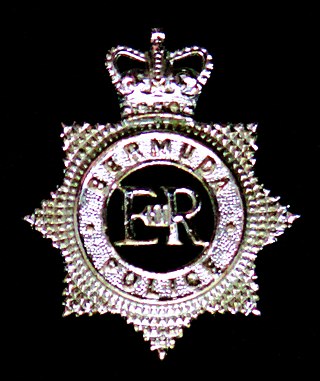
The Bermuda Police Service is the law enforcement agency of the British Overseas Territory and former Imperial fortress of Bermuda. It is responsible for policing the entire archipelago, including incorporated municipalities, and the surrounding waters. It is part of, and entirely funded by, the Government of Bermuda. Like the Royal Bermuda Regiment, it is under the nominal control of the territory's Governor and Commander in Chief, although, for day-to-day purposes, control is delegated to a minister of the local government. It was created in 1879, as Bermuda's first professional police service. In organisation, operation, and dress, it was created and has developed in line with the patterns established by British police services, such as the City of Glasgow Police, and the Metropolitan Police Service.
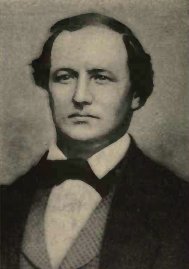
Colin Campbell Ferrie was a Canadian merchant, banker, and politician.
Events from the year 1829 in Ireland.
Events from the year 1863 in Ireland.

Partick Cross is a major road junction in Partick, in the west end of the city of Glasgow, Scotland. The junction is the meeting point of Dumbarton Road, Byres Road, Partick Bridge Street and Coopers Well Street.
The history of the Metropolitan Police in London is long and complex, with many different events taking place between its inception in 1829 and the present day.

Police Scotland, officially the Police Service of Scotland, is the national police force of Scotland. It was formed in 2013, through the merging of eight regional police forces in Scotland, as well as the specialist services of the Scottish Police Services Authority, including the Scottish Crime and Drug Enforcement Agency. Although not formally absorbing it, the merger also resulted in the winding up of the Association of Chief Police Officers in Scotland.
Events from the year 1827 in Scotland.
Inchview was a football ground in the Whiteinch area of Glasgow, Scotland. It was the home ground of Partick from the 1870s until 1885, and of Partick Thistle from 1885 until 1897.
Partick Football Club was a football club based in the burgh of Partick, Scotland. The club was founded in 1875 and played their home games at Inchview on Dumbarton Road in the Whiteinch neighbourhood until they went defunct in 1885.












